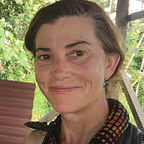Beware Passionate Intensity. Embrace Subtle Acts of Resistance.
Sipping my Sunday morning coffee at my friend Carol Dysinger’s kitchen table, I note that her copy of The Constitution is impressively dog-eared. She’s off shooting a documentary in Afghanistan, and I’m thinking about why she, and those of us who write, make films, tell stories, keep doing it. I wander over to Maria Popova’s gift to the internet, Brain Pickings for some intellectual solace, she points me to Susan Sontag, who challenges with clarity:
“There is an essential … distinction between stories, on the one hand, which have, as their goal, an end, completeness, closure, and, on the other hand, information, which is always, by definition, partial, incomplete, fragmentary.”
We are hungry for meaning, and stories are satisfying. At its best storytelling allows us to escape the false urgency of information to experience another reality and enrich our own. I bow to Obama’s everyday eloquence on the subject, from his interview with NYTimes book editor Michiki Kakutani:
“At a time,” he says, “when so much of our politics is trying to manage this clash of cultures brought about by globalization and technology and migration, the role of stories to unify — as opposed to divide, to engage rather than to marginalize — is more important than ever.”
Absolutely. And yet, journalism is threatened by the notion that reporting on the release of information in to the public sphere is a story. Twitter, Facebook, the crawl, breaking news alerts, feed our addictive need for newness to distract us from fear, loneliness, and the work of being with other people who are not like us. The digital interface is a dangerous place where human response is mediated by technology and we are forced to imagine the facial expression, tone of voice, the feeling of the spoken word. This is not say there isn’t value in digital communication, but to question how we value it.
Great non-fiction storytelling brings with it a level of detail and context, and most pointedly the specific perspective of the author(s) which transforms information into meaning. In that sense, the great danger is not ‘fake news’ per se, but the questionability of facts and the denigration of science. The journalist or the storyteller is of tremendous value to society because they are accountable, their facts verifiable. The storyteller offers authorial conviction, the courage to stand behind the film, story, essay, or photograph and say “This is what I saw. Here is what I heard.”
(While I have deep affection for The Economist, the lack of byline seemingly portends the text just wrote itself; it is disconcerting.)
W.B. Yeats warned of the moment in which “the best lack all conviction, while the worst are full of passionate intensity” it is then that the world falls apart, the center cannot hold. Just days before the inauguration of a man celebrated for his passionate intensity, I hope that we are blessed with a call to action that will be heard by those who listen with a full heart and eyes wide open. As a country, we must turn to the first Amendment and reinterpret it for our time.
Americans believe that a free press is a hallmark of our democracy. When a filmmaker or reporter is threatened, imprisoned or even killed while doing their work in places like Turkey, Egypt, China and not to forget Syria, it’s easy to see and feel outrage.
At this moment in this country, it is silent collusion when we accept less than we expect from the media. When we blame ‘the media’ for the election, and a host of other ills, we fail to separate out the work of a wide range of storytellers who investigate, ruminate, write, edit, record, photograph and search for truth. (In documentary I think of Matthew Heineman, Stanley Nelson, Laura Poitras, Nanfung Wang, in print David Fahrentold’s coverage of Trump, anything by Michael Lewis, the ones we lost David Gilkey, Anthony Shadid, Jim Foley, Marie Colvin…too many more.)
I remind myself to beware of stories that include terms like “some people say” and “it has been reported that.” I am worried that the term “Trump tweeted” might start to pass for journalism.
Evan Osnos closes his essay “When Tyranny Takes Hold” with a subtle warning: “Tyranny does not begin with violence; it begins with the first gesture of collaboration. Its most enduring crime is drawing decent men and women into its siege of the truth.”
As an American citizen and as a media consumer, I wonder how to not collaborate in this barely-elected demagogue’s construction of a reality in which the people that tell the stories that need to be told and fight for justice on our behalf are literally corralled off to the side in his insatiable quest for wealth and power. In a small but essential way, reading the actual newspaper, listening to NPR, watching a documentary, is an act of resistance.
